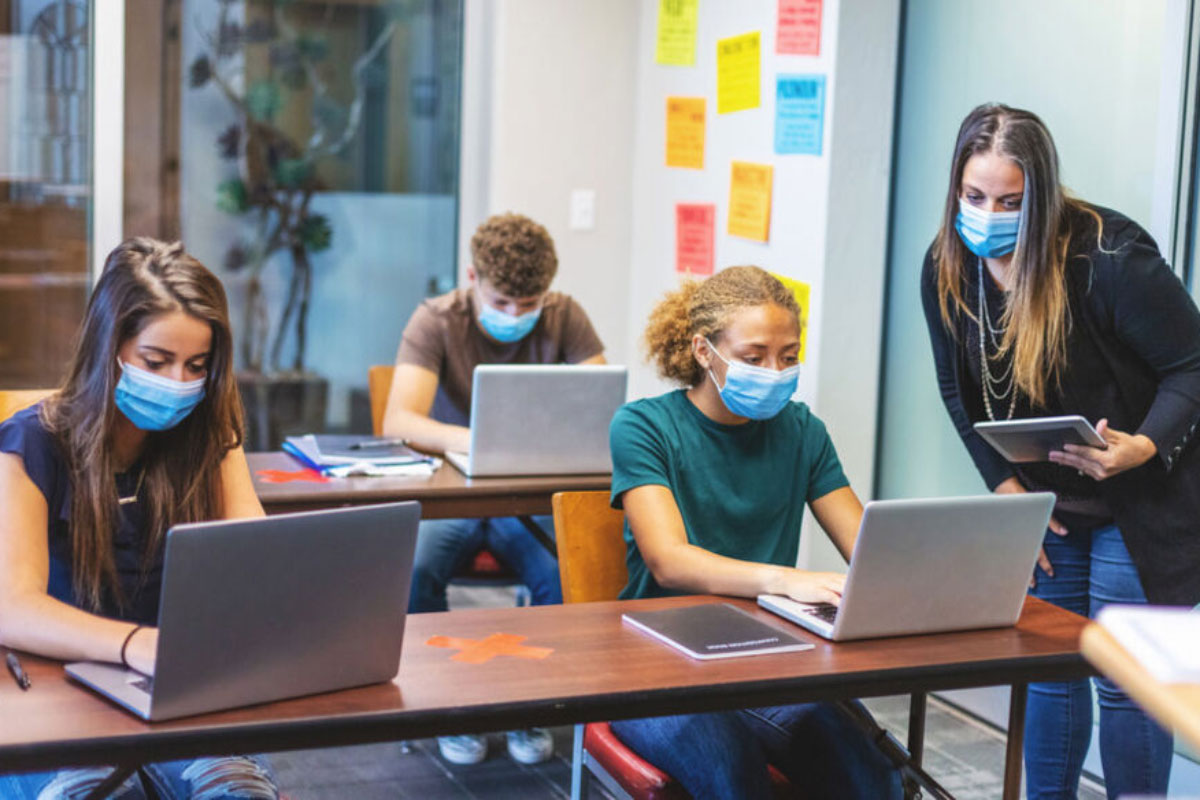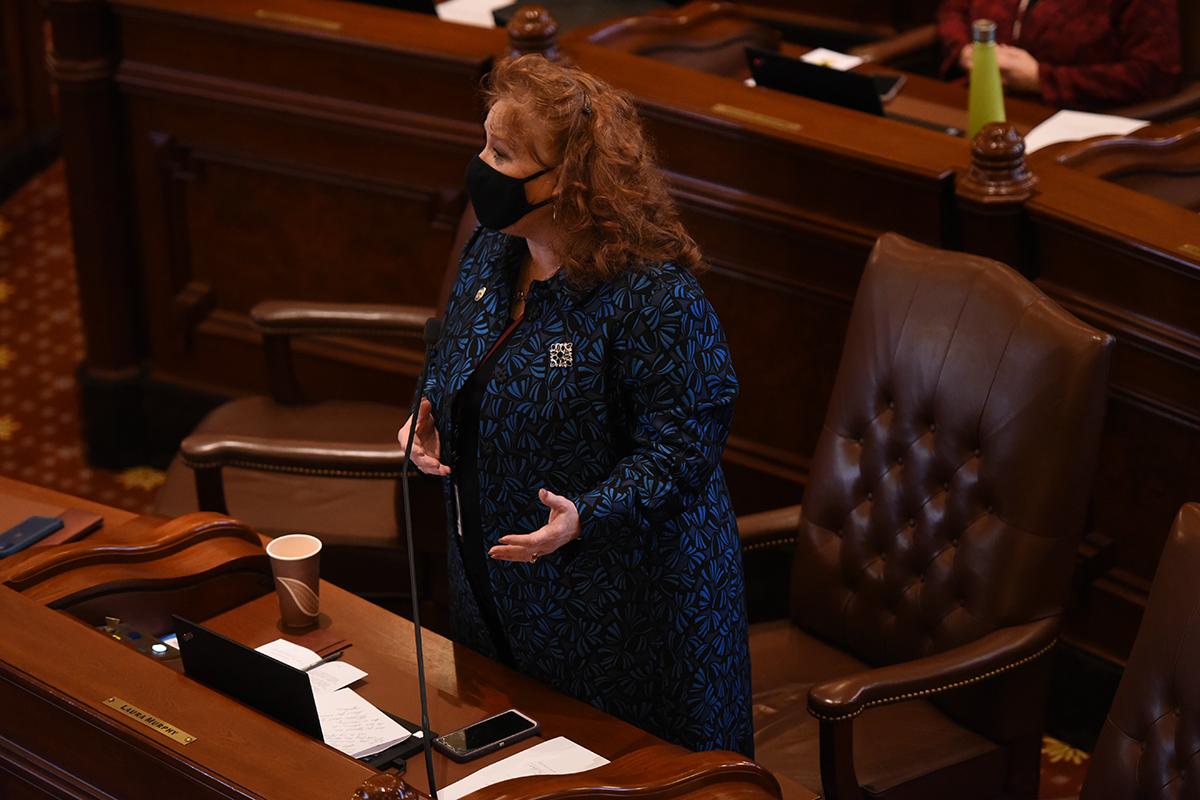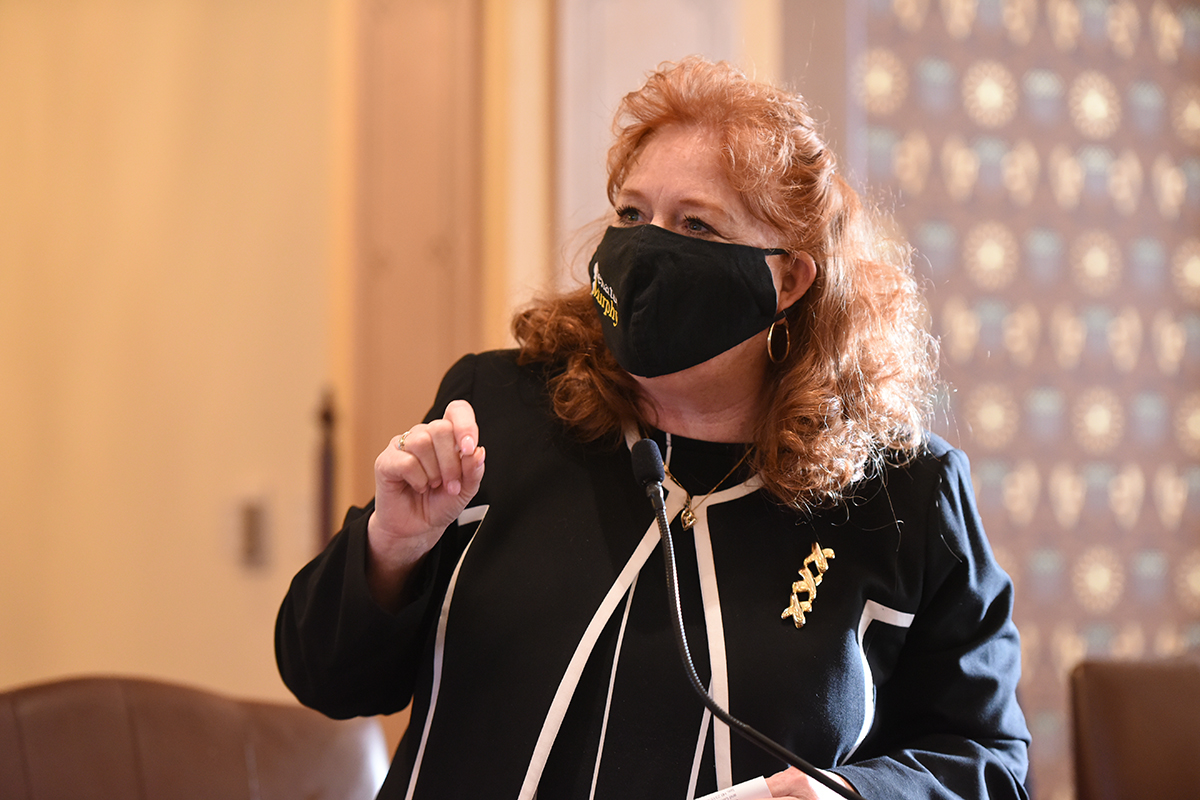- Details
- Category: Senator Laura Murphy News
SPRINGFIELD – Illinoisans on Medicare would be able to switch supplemental plans without worrying about higher premiums, underwriting or pre-existing conditions under a new measure introduced by State Senator Laura Murphy (D-Des Plaines).
“If their supplemental plan rates go up, many older adults are denied the chance to switch to a less expensive plan because of a pre-existing condition. They’re locked into their current plan,” said Murphy. “It’s time to give older Illinoisans the freedom to seek lower costs elsewhere.”
The measure would establish an annual open enrollment period for each Medicare supplement policyholder between 65 and 75 years of age that begins on the policyholder’s birthday and lasts 45 days.
Read more: Murphy bill would give older Illinoisans more flexibility to shop for insurance policies
- Details
- Category: Senator Laura Murphy News
 DES PLAINES – State Senator Laura Murphy (D-Des Plaines) recently honored 507 Northwest Suburban high school students who were named 2021-22 Illinois State Scholars by the Illinois Student Assistance Commission.
DES PLAINES – State Senator Laura Murphy (D-Des Plaines) recently honored 507 Northwest Suburban high school students who were named 2021-22 Illinois State Scholars by the Illinois Student Assistance Commission.
Illinois State Scholar winners rank in approximately the top 10% of the state’s high school seniors from 676 high schools in all 102 counties. Selection is based on a combination of standardized test scores and class rank or unweighted GPA at the end of the student’s junior year. ISAC works in conjunction with the students’ high school guidance counselors to determine the winners.
“This generation of students has faced challenges many of us couldn’t have imagined,” Murphy said. “The most recent class of Illinois State Scholars—as well as their teachers, administrators and families—have shown unprecedented dedication and perseverance. Their hard work has made our community proud.”
The Scholars from the Northwest Suburbs include students from eight area high schools, including Elk Grove High School, J.B. Conant High School, Maine Township High School South, Maine Township High School West, Schaumburg Christian School, Schaumburg High School, Willows Academy and Lake Park West High School.
Recipients of the award will receive a congratulatory letter from ISAC, and a Certificate of Achievement will be sent to their high school. State Scholars will also receive a digital badge issued by ISAC that can be displayed on online profiles, exhibited on social media, and shared with prospective colleges and employers.
“With college and financial aid applications looming for many students, I hope this well-earned recognition will give them a boost,” Murphy said. “I look forward to watching our hardworking young neighbors succeed in the years to come.”
More information about the State Scholar program can be found at ISAC’s website.
- Details
- Category: Senator Laura Murphy News
 SPRINGFIELD – Two measures proposed by State Senator Laura Murphy (D-Des Plaines) to increase transparency for mobile home buyers and improve conditions in mobile home parks have been sponsored in the House.
SPRINGFIELD – Two measures proposed by State Senator Laura Murphy (D-Des Plaines) to increase transparency for mobile home buyers and improve conditions in mobile home parks have been sponsored in the House.
“Financial transparency and access to clean water are foundational rights that should be afforded to any homeowner,” Murphy said. “I’m proud to see this legislation being picked up in the House, bringing us one step closer to making these initiatives a reality.”
A loan for a mobile home located in a mobile home park is different from a mortgage: Mobile homes are assessed and taxed as personal property rather than real estate, interest rates are often much higher than those for typical home loans, and refinancing options are limited. To ensure residents are well informed when purchasing a mobile home, Senate Bill 1779 would require lenders to disclose these differences to prospective mobile home buyers.
Murphy has also introduced Senate Bill 1780, which calls for the owner of a mobile home park to provide water to residents if the normal water supply has been disrupted for more than three days, unless the disruption is due to circumstances beyond the owner’s control. Murphy was inspired to introduce the legislation after a weeklong water shortage in 2019 at the Blackhawk Estates mobile home park in unincorporated Des Plaines, which left residents unable to shower, do laundry or wash dishes.
“Every resident deserves to be able to rely on safe living conditions and to know where they stand financially,” Murphy said. “These measures ensure mobile home owners are protected just like any Illinois homeowner.”
Senate Bills 1779 and 1780 have been sponsored in the House by State Rep. Marty Moylan (D-Des Plaines).
- Details
- Category: Senator Laura Murphy News
 SPRINGFIELD – To protect Illinois drivers’ personal information and travel records from falling into the wrong hands, State Senator Laura Murphy (D-Des Plaines) advanced legislation out of the Senate Friday to limit the instances in which this data can be shared.
SPRINGFIELD – To protect Illinois drivers’ personal information and travel records from falling into the wrong hands, State Senator Laura Murphy (D-Des Plaines) advanced legislation out of the Senate Friday to limit the instances in which this data can be shared.
“You have the right to keep your personal information private—that includes your travel history,” Murphy said. “This legislation would tighten up current laws to ensure your comings and goings aren’t shared without valid cause.”
In 2019, reports revealed that the Illinois Tollway Authority was openly sharing drivers’ travel data with local police departments and divorce attorneys. The data showed individuals’ movements on state tollways, in addition to personal contact information, license plate numbers and more.
Under Murphy’s bill, private data derived from toll collections could only be released for toll collection purposes and pursuant to law enforcement investigations. Except in cases of emergency, police departments would be required to have a warrant or subpoena in order to obtain a driver’s information from the Tollway.
Any personally identifiable information connected to travel data would have to be deleted from Illinois Tollway Authority records within five years.
“Releasing travel records to third parties isn’t just a violation of privacy—it can put individuals like domestic violence survivors in danger,” Murphy said. “It is critical that the Illinois Tollway treats this sensitive information with the care it deserves.”
Senate Bill 2235 passed the Senate and now heads to the House.
- Details
- Category: Senator Laura Murphy News

SPRINGFIELD – To ensure universities are using tuition and tax dollars in service of their students, State Senator Laura Murphy (D-Des Plaines) advanced legislation out of the Senate Friday to crack down on university administrators who continue to exploit loopholes in the law by receiving massive payouts, or “golden parachutes,” after leaving their positions.
Lawmakers passed the Government Severance Pay Act in 2018 to limit the amount paid in university severance packages. Murphy’s measure strengthens the act by expanding the definition of severance pay and defining limits on compensation.
“Students and taxpayers shouldn’t have to foot the bill for a retired administrator’s six-figure payouts,” Murphy said. “The Government Severance Pay Act was intended to ensure our institutions spend responsibly, with the campus community in mind—it’s time we hold them to that standard.”
- Details
- Category: Senator Laura Murphy News

SPRINGFIELD – In a victory for mobile home owners across Illinois, two measures proposed by State Senator Laura Murphy (D-Des Plaines) to increase transparency for mobile home buyers and improve conditions in mobile home parks have both passed the Senate.
“Every homeowner deserves to know the terms of their loan agreement and to be able to depend on a basic standard of living—that includes mobile home owners,” Murphy said. “These initiatives set the bar, ensuring residents of mobile home parks have the same protections as any other Illinoisan.”
A loan for a mobile home located in a mobile home park is different from a mortgage: Mobile homes are assessed and taxed as personal property rather than real estate, interest rates are often much higher than those for typical home loans, and refinancing options are limited. To ensure residents are well informed when purchasing a mobile home, Senate Bill 1779 would require lenders to disclose these differences to prospective mobile home buyers.
Read more: Murphy initiatives establish protections for mobile home owners
- Details
- Category: Senator Laura Murphy News
SPRINGFIELD – Following a series of pedestrian deaths in the community she represents, State Senator Laura Murphy (D-Des Plaines) has advanced a plan to prevent further tragedy by requiring the Illinois Department of Transportation to look more closely into traffic accidents on state highways that result in the death of a pedestrian.
“The design of a roadway can play a large part in traffic accidents, with deadly consequences,” Murphy said. “By responding to these accidents with action, we can pinpoint those hazards and make a fix before more lives are lost.”
Read more: Murphy advances pedestrian safety legislation in memory of local traffic losses
- Details
- Category: Senator Laura Murphy News
 SPRINGFIELD – To clarify local governments’ authority to determine their own boundaries, State Senator Laura Murphy (D-Des Plaines) sponsored legislation to protect and strengthen municipalities’ rights to annex surrounding properties.
SPRINGFIELD – To clarify local governments’ authority to determine their own boundaries, State Senator Laura Murphy (D-Des Plaines) sponsored legislation to protect and strengthen municipalities’ rights to annex surrounding properties.
“There are statutory requirements in place to ensure local governments can annex property legally and with the best interests of the community in mind,” Murphy said. “Recent court rulings have complicated these requirements—this legislation sets them straight.”
Read more: Murphy: Municipalities must have clear guidelines when making annexation decisions
More Articles …
Page 16 of 27















 © 2026 Illinois Senate Democratic Caucus
© 2026 Illinois Senate Democratic Caucus